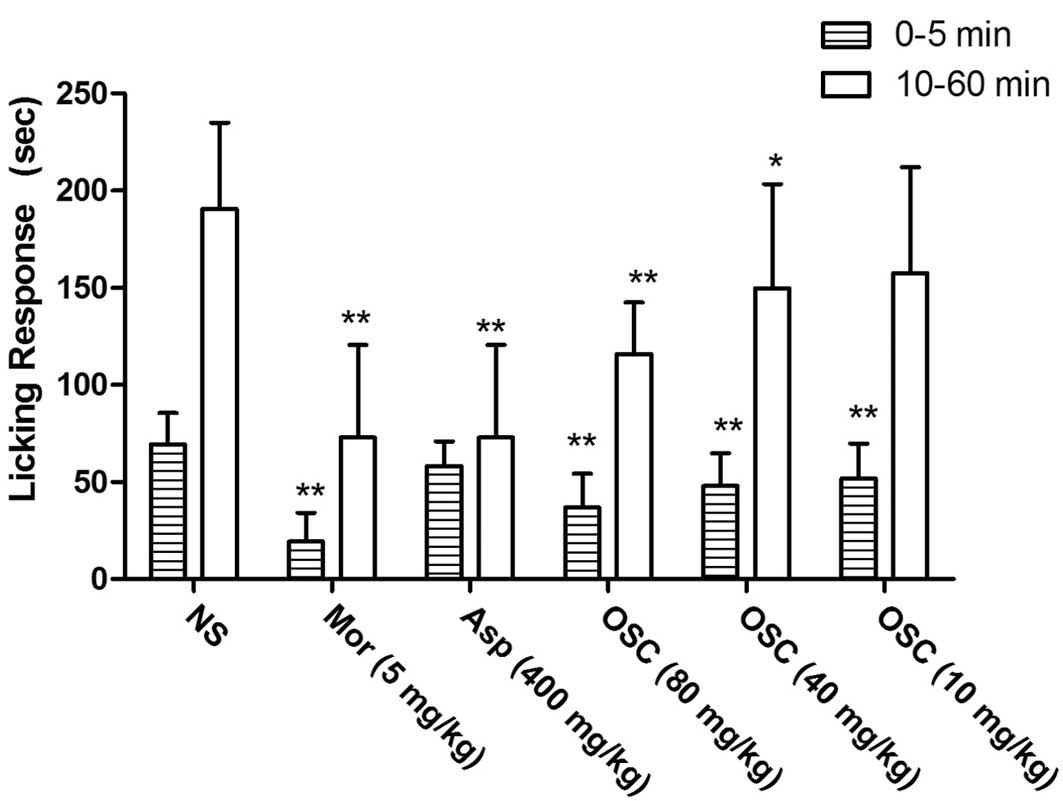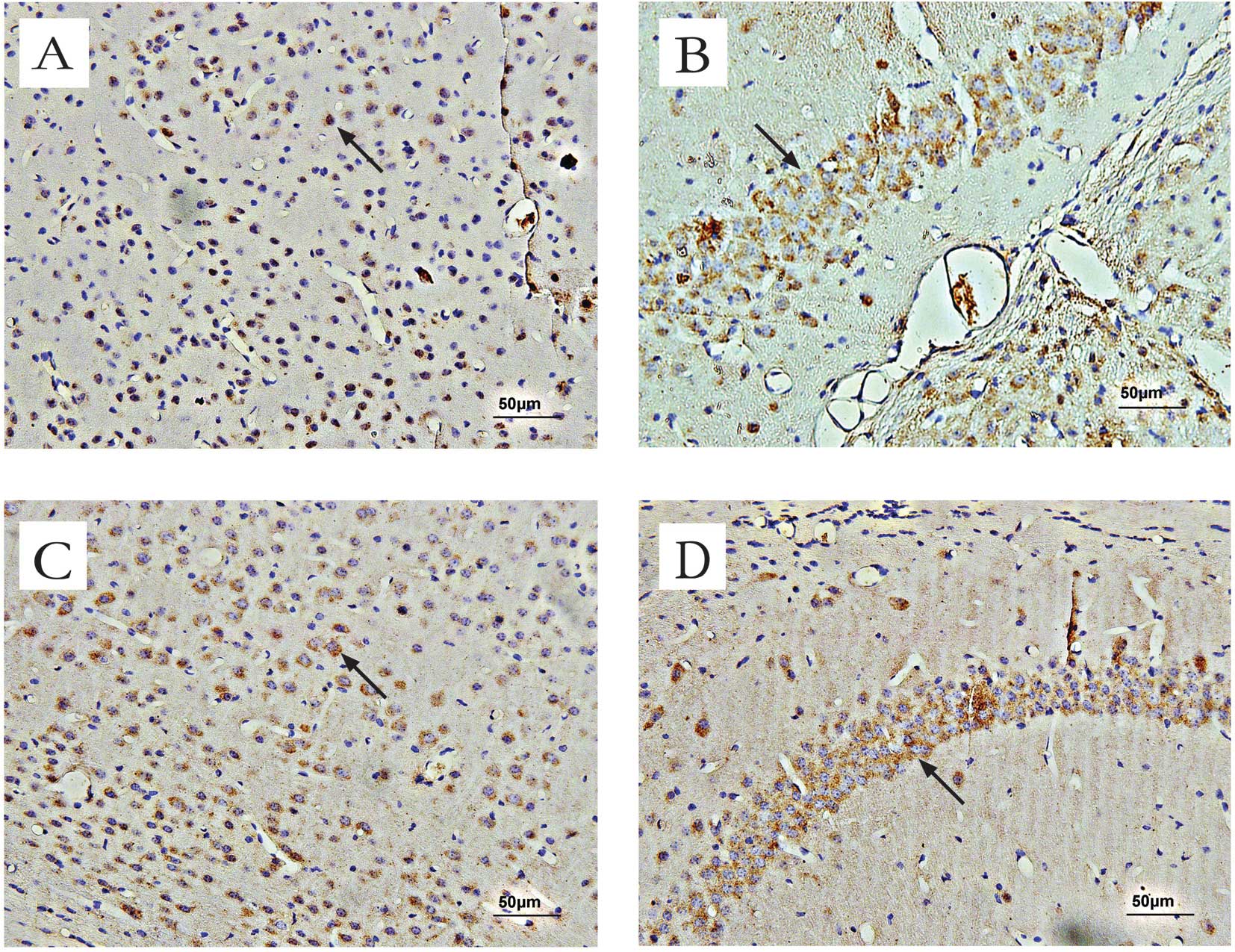|
1
|
Millan MJ: Descending control of pain.
Prog Neurobiol. 66:355–474. 2002. View Article : Google Scholar
|
|
2
|
Malcangio M and Bowery NG: GABA and its
receptors in the spinal cord. Trends Pharmacol Sci. 17:457–462.
1996. View Article : Google Scholar : PubMed/NCBI
|
|
3
|
Zhang JT, Wang W and Duan ZH: Progress of
research and application of matrine-type alkaloids. Prog Mod
Biomed. 7:541–544. 2007.(In Chinese).
|
|
4
|
Rodrigues AL, da Silva GL, Mateussi AS, et
al: Involvement of monoaminergic system in the antidepressant-like
effect of the hydroalcoholic extract of Siphocampylus
verticillatus. Life Sci. 70:1347–1358. 2002. View Article : Google Scholar : PubMed/NCBI
|
|
5
|
Trentin AP, Santos AR, Miguel OG,
Pizzolatn MG, Yunes RA and Calixto JB: Mechanisms involved in the
antinociceptive effect in mice of the hydroalcoholic extract of
Siphocampylus verticillatus. J Pharm Pharmacol. 49:567–572.
1997. View Article : Google Scholar : PubMed/NCBI
|
|
6
|
Li ZHR: The pharmaceutical effect and
clinical development of kushenin. West China J Pharm Sci.
18:435–437. 2003.(In Chinese).
|
|
7
|
Wang XH, Huang SK and Lin P:
Pharmacokinetics and pharmacodynamics of sophocarpine and
oxysophocarpine. J China Pharm Univ. 23:161–164. 1992.(In
Chinese).
|
|
8
|
Yan L and Jiang YX: Studies of analgesia
effect of oxysophoridien. Chin Tradit Herb Drugs. 37:1061–1062.
2006.(In Chinese).
|
|
9
|
Grant GJ, Vermenulen K, Zakowski MI,
Stener M, Turndorf H and Langerman L: Prolonged analgesia and
decreased toxicity with liposomal morphine in a mouse model. Anesth
Analg. 79:706–709. 1994.PubMed/NCBI
|
|
10
|
Goyal R and Anil K: Protective effect of
alprazolam in acute immobilization stress-induced certain
behavioral and biochemical alterations in mice. Pharmacol Rep.
59:284–290. 2007.PubMed/NCBI
|
|
11
|
Eddy NB and Leimbach D: Synthetic
analgesics. II Dithienylbutenyl- and dithienylbutylamines. J
Pharmacol Exp Ther. 107:385–393. 1953.PubMed/NCBI
|
|
12
|
Qian LW, Dai WH and Wang LL: Toxicity
study on sophocarpine and oxysophocarpine in mice. Chin J Exp
Tradit Med Formulae. 18:256–258. 2012.(In Chinese).
|
|
13
|
Dongmo AB, Nguelefack T and
Lacaille-Dubois MA: Antinociceptive and anti-inflammatory
activities of Acacia pennata wild (Mimosaceae). J
Ethnopharmacol. 98:201–206. 2005. View Article : Google Scholar : PubMed/NCBI
|
|
14
|
Corrêa CR and Calixto JB: Evidence for
participation of B1 and B2 kinin receptors in formalin-induced
nociceptive response in the mouse. Br J Pharmacol. 110:193–198.
1993.PubMed/NCBI
|
|
15
|
Vaz ZR, Filho VC, Yunes R and Calixto JB:
Antinociceptive action of 2-(4-bromobenzoyl)-3-methyl-4,6-dimethoxy
benzofuran, a novel xanthoxyline derivative on chemical and thermal
models of nociception in mice. J Phamacol Exp Ther. 278:304–312.
1996.PubMed/NCBI
|
|
16
|
Santos AR and Calixto JB: Further evidence
for the involvement of tachykinin receptor subtypes in formalin and
capsaicin models of pain in mice. Neuropeptides. 31:381–389. 1997.
View Article : Google Scholar : PubMed/NCBI
|
|
17
|
Xu SY, Bian RL and Chen X: Methods of
pharmacological experiments. 3rd ed. The People’s Medical
Publishing House; Beijing: pp. 7022002
|
|
18
|
Le Bars D, Gozariu M and Cadden SW: Animal
models of nociception. Pharmacol Rev. 53:597–652. 2001.
|
|
19
|
Thomsen M, Wörtwein G, Olesen MV, et al:
Involvement of Y(5) receptors in neuropeptide Y agonist-induced
analgesic-like effect in the rat hot plate test. Brain Res.
1155:49–55. 2002. View Article : Google Scholar : PubMed/NCBI
|
|
20
|
Tjølsen A, Berge OG, Hunskaar S, Rosland
JH and Hole K: The formalin test: an evaluation of the method.
Pain. 51:5–17. 1992.
|
|
21
|
Chau T: Pharmacological methods in the
control of inflammation. Modern Methods in Pharmacology. Chang JY
and Lewis AJ: Alan R. Liss; New York: pp. 195–212. 1989
|
|
22
|
Walwyn WM, Matsuka Y, Arai D, et al:
HSV-1-mediated NGF delivery delays nociceptive deficits in a
genetic model of diabetic neuropathy. Exp Neurol. 198:260–270.
2006. View Article : Google Scholar : PubMed/NCBI
|
|
23
|
Rujjanawate C, Kanjanapothi D and Panthony
A: Pharmacological effect and toxicity of alkaloids from
Gelsemium elegans Benth. J Ethnopharmacol. 89:91–95. 2003.
View Article : Google Scholar : PubMed/NCBI
|
|
24
|
Hunskaar S and Hole K: The formalin test
in mice: dissociation between inflammatory and non-inflammatory
pain. Pain. 30:103–114. 1987. View Article : Google Scholar : PubMed/NCBI
|
|
25
|
Koster R, Anderson M and De Beer EJ:
Acetic acid for analgesic screening. Fed Proc. 18:412–416.
1959.
|
|
26
|
Hendershot LC and Forsaith J: Antagonism
of the frequency of phenylquinone-induced writhing in the mouse by
weak analgesics and nonanalgesics. J Pharmacol Exp Ther.
125:237–240. 1959.PubMed/NCBI
|
|
27
|
Collier HO, Dinneen LC, Johnson CA and
Schneider C: The abdominal constriction response and its
suppression by analgesic drugs in the mouse. Br J Pharmacol
Chemother. 32:295–310. 1968. View Article : Google Scholar : PubMed/NCBI
|
|
28
|
Martire M, Castaldo P, D’Amico M, Preziosi
P, Annuzito L and Taglialatela M: M channels containing KCNQ2
subunits modulate norepinephrine, aspartate, and GABA release from
hippocampal nerve terminals. J Neurosci. 24:592–597. 2004.
View Article : Google Scholar : PubMed/NCBI
|
|
29
|
Lujan R: Subcellular regulation of
metabotropic GABA receptors in the developing cerebellum.
Cerebellum. 6:123–129. 2007. View Article : Google Scholar : PubMed/NCBI
|
|
30
|
Condés-Lara M, Rojas-Piloni G,
Martínez-Lorenzana G, López-Hidalgo M and Rodríguez-Jiménez J:
Hypothalamospinal oxytocinergic antinociception is mediated by
GABAergic and opiate neurons that reduce A-delta and C fiber
primary afferent excitation of spinal cord cells. Brain Res.
1247:38–49. 2009.
|
|
31
|
Barnard EA, Skolnick P, Olsen RW, et al:
International Union of Pharmacology. XV Subtypes of γ-aminobutyric
acidA receptors: classification on the basis of subunit structure
and receptor function. Pharmacol Rev. 50:291–313. 1998.PubMed/NCBI
|
|
32
|
Knabl J, Witschi R, Hösl K, et al:
Reversal of pathological pain through specific spinal
GABAA receptors subtypes. Nature. 451:330–334. 2008.
View Article : Google Scholar : PubMed/NCBI
|
|
33
|
Whiting PJ, Bonnert TP, McKernan RM, et
al: Molecular and functional diversity of the expanding
GABAA receptor gene family. Ann N Y Acad Sci.
868:645–653. 1999. View Article : Google Scholar : PubMed/NCBI
|
|
34
|
Sieghart W: Structure, pharmacology, and
function of GABAA receptor subtypes. Adv Pharmacol.
54:231–263. 2006. View Article : Google Scholar
|
|
35
|
Nutt D: GABAA receptors:
subtypes, regional distribution, and function. J Clin Sleep Med.
2:S7–S11. 2006.
|
|
36
|
Möhler H, Fritschy JM and Rudolph U: A new
benzodiazepine pharmacology. J Pharmacol Exp Ther. 300:2–8.
2002.
|
|
37
|
Sieghart W and Sperk G: Subunit
composition, distribution and function of GABA(A) receptor
subtypes. Curr Top Med Chem. 2:795–816. 2002. View Article : Google Scholar : PubMed/NCBI
|
|
38
|
Pirker S, Schwarzer C, Wieselthaler A,
Sieghart W and Sperk G: GABA(A) receptors: immunocytochemical
distribution of 13 subunits in the adult rat brain. Neuroscience.
101:815–850. 2000. View Article : Google Scholar : PubMed/NCBI
|
|
39
|
Crestani F, Martin JR, Möhler H and
Rudolph U: Mechanism of action of the hypnotic zolpidem in vivo. Br
J Pharmacol. 131:1251–1254. 2000. View Article : Google Scholar : PubMed/NCBI
|
|
40
|
Melzack R and Wall PD: Pain mechanism: a
new theory. Science. 150:971–979. 1965. View Article : Google Scholar : PubMed/NCBI
|
|
41
|
Wall PD: The substantia gelatinosa. A gate
control mechanism set across sensory pathway. Trends Neurosci.
3:221–224. 1980. View Article : Google Scholar
|
|
42
|
Redecker C, Luhmann HJ, Hagemann G,
Fritschy JM and Witte OW: Differential downregulation of
GABAA receptor subunits in widespread brain regions in
the freeze-lesion model of local cortical malformations. J
Neurosci. 20:5045–5053. 2000.PubMed/NCBI
|




















